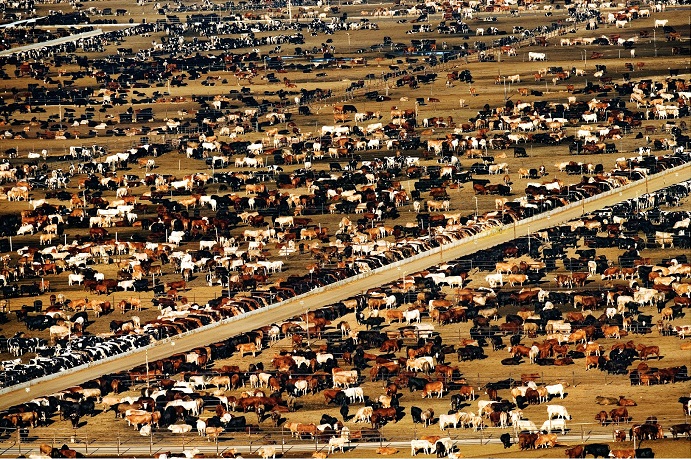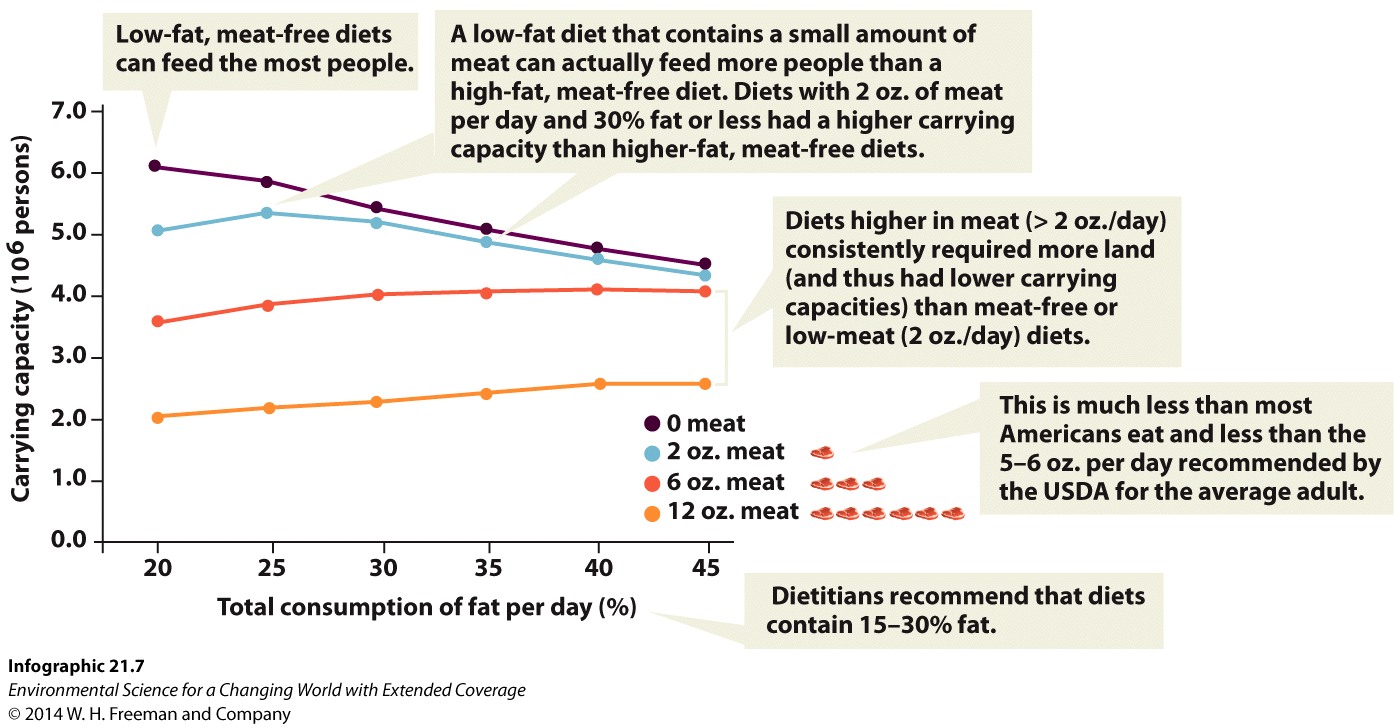
Chapter 21. Chapter 21: Agriculture: Raising Livestock
How can eating lower on the food chain and eating smaller servings of animal products reared on grasslands help maximize food supplies?

Guiding Question 21.5
How can eating lower on the food chain and eating smaller servings of animal products reared on grasslands help maximize food supplies?
Why You Should Care
Between pathogens, environmental degradation, and resource exhaustion, it seems clear that modern production methods of animal products are not sustainable. You learned that, in food webs, energy is lost each time it is transferred up a food chain, such that only a few top predators can be supported by the many producers at the base. Well, humans are part of the ecosystem, too, and there are now too many of us to be top predators. It is simple thermodynamics: More energy and resources are lost to produce animal-based foods than plant-based foods, so we will be able to feed more people on a diet based primarily on plants. This doesn't mean that people have to become vegetarians, but it would be best if portion sizes of meat were to become smaller. This not only will extend the food supply, it will be healthier for us all.

1.
In this graph, carrying capacity is measured in ______ of people.
| A. |
| B. |
| C. |
| D. |
2.
A diet including small amounts of meat can feed more total people than a no-meat diet when:
| A. |
| B. |
| C. |
| D. |
3.
Based on the recommended daily calories from fat, the diet that can both feed the most people and provide them optimal nutrition is a:
| A. |
| B. |
| C. |
| D. |
4.
Based on the recommended daily calories from fat, the diet that can both feed the most people and provide them optimal nutrition is a:
| A. |
| B. |
| C. |
| D. |
5.
The current average American diet (~6 oz of meat and 40% calories from fat) supports about ________ the number of people that a no-meat diet and 20% of calories from fat would support.
| A. |
| B. |
| C. |
| D. |
6.
Thought Question: If 2 oz of meat or less per day would support the most people and seems to be healthier in terms of fat intake, and probably other factors, why would the USDA recommend 5–6 oz of meat per day?
Short-Answer Questions
Suppose that, based on what you’ve learned about the health, environmental, and ethical downsides of producing animal products, you decide to eliminate meat, eggs, and dairy from your diet. Your best friend is afraid he may need to find a mental-health facility for you, but he decided he should ask you some questions first to determine if you are thinking clearly. How would you answer the following questions?
1) How can you stay healthy if you don’t have meat in your diet?
2) How can you get enough protein?
3) Don't you think it's un-American not to eat beef? What could be more American than a hamburger?
4) What do you mean that it's socially irresponsible to eat meat?
5) What do you mean that it's cruel to the animals to raise them for meat? You have to kill them, after all.
6) How can meat be bad for the environment; cows eat grass and produce fertilizer, right?
7) Aren't you worried about all of the chemicals they spray on crops?
8) Okay, so are you going to judge me now because I want to keep meat in my diet? What should I do?
2) There is plenty of protein in plants; it just is not as concentrated in most plant foods compared to animal foods. After all, cows convert the protein in grass to meat.
3) In the United States, food is plentiful and readily available. It isn’t, however, always safe. The chances of eating a tainted hamburger are rare (pardon the pun), but they still exist.
4) There are two directions you could take with this answer. Firstly, in the United States, eating meat supports practices that make food production less adequate to support the population. Secondly, compared to those living in less-developed countries, it may seem unfair to use a disproportional amount of global resources and produce more greenhouse gases to support our affluent diet.
5) Animals in general must be killed to produce meat, but their treatment leading up to slaughter is a matter for practical, if not ethical, debate. One could argue that forcing livestock and poultry to live in densely populated enclosures overflowing with manure is inhumane. Even if that were not a convincing argument against modern meat production, there is the fact that raising livestock this way necessitates the unsafe overuse of antiobiotics.
6) In fact, cows in CAFOs produce too much fertilizer—so much that it threatens to pollute water sources. The water and fuel resources used to produce meat are likely unstainable in the long term as well. Furthermore, forested land is being cleared for meat production at an unsustainable rate, especially in less-developed tropical countries.
7) Those chemicals can be washed off; hormones and antibiotics in meat cannot, and organic meat is costlier than organic vegetables.
8) Your friend does not have to have a guilty conscience if he wants to include meat in his diet. For the sake of his health and the environment, however, he might want to start considering meat the side dish and vegetables the main course.
Activity results are being submitted...